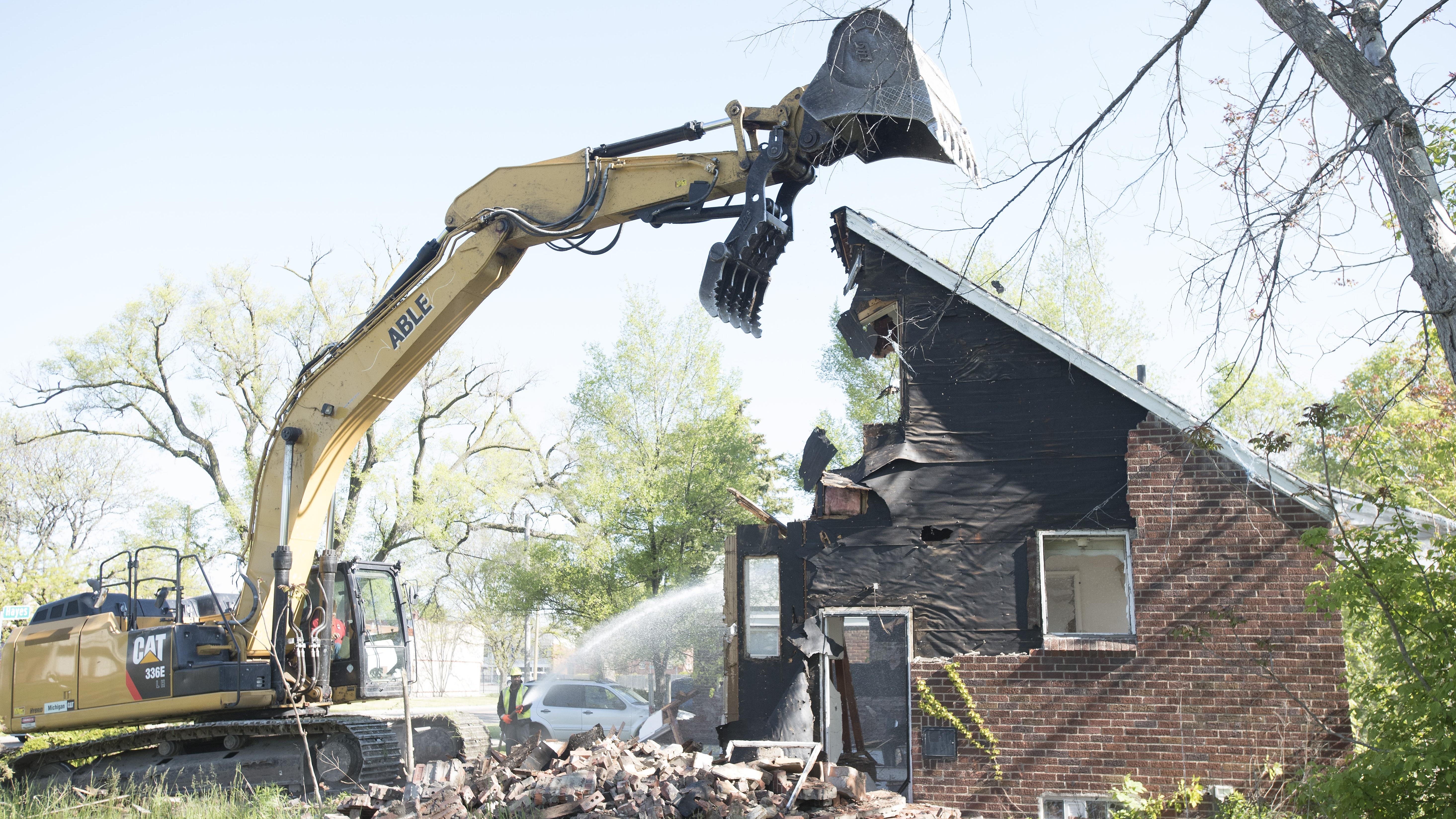Detroit wants to boost inclusion in demo contracts
 Christine Ferretti
Christine Ferretti
Detroit — City Council members grilled the city's administration and its land bank Monday over whether enough is being done to ensure minority and city-based companies are getting fair access to millions worth of federal demolition work.
The panel is turning up the heat on the issue amid heightened concern over a lack of diversity in the federal program that's awarded $173 million since spring 2014.
So far, about 28 percent of the contract dollars — or $48 million — has gone to women-owned or minority-owned businesses, said Tammy Daniels, demolition director for the land bank.
Overall, $258 million has been earmarked for Detroit under the federal effort that has about $108 million left to use by Dec. 31, 2020.
Detroit Council President Brenda Jones on Monday slammed the land bank and city's contracting staff over concerns tied to the administration of the program.
"A lot of minority contractors we have don’t want to do business with the city," said Jones on Monday during a council subcommittee session, noting companies are turned off by lagging payments, "drama" tied to an ongoing federal criminal investigation and feel as if they've been "blackballed."
"... It concerns me when I walk out the door and a minority contractor is waiting there for me saying, 'we're not getting the business' or say 'we haven't gotten paid,'" Jones said. 'I'm hearing everything."
Detroit's massive demolition effort remains the focus of a federal criminal investigation that came to light after concerns were raised in fall 2015 over bidding practices and spiraling costs. It's also been the subject of state and local reviews.
The federal program is overseen by the city's land bank and building authority and its funding is administered through the Michigan State Housing Development Authority.
Land bank and city staff say they must follow state and federal rules that limit how much preference can be given to certain firms.
Mayor Mike Duggan told The Detroit News on Monday that the city doesn't have discretion. Accepting federal money, he said, means accepting federal rules.
"When the federal government gives you money, the feds consider it to be the money of all taxpayers in the country. So no federal program allows you to have local preferences," Duggan said. "Our team is following the federal rules, and we have no legal ability to offer local preference.”
Daniels said she intends to urge state housing officials to lobby for federal policy changes that would give more minorities and city-based companies work.
"We have already been thinking about it and trying to brainstorm ways to increase minority participation. I want to have a meaningful proposal," Daniels told reporters after the session. "Our hands are effectively tied in terms of preference we can give. They (MSHDA) would be the ones that would lobby on our behalf."
A 2006 amendment to the state Constitution prohibits the use of minority preferences in contracting and federal changes in the spring of this year now prohibit geographic preferences, she said.
MSHDA spokeswoman Katie Bach said Monday the land bank recently raised its concern with MSHDA over minority participation. When changes are proposed for the program, she said, they are evaluated by the state and U.S. Treasury. In this case, "a decision is still pending."
When asked whether MSHDA had concerns over diversity in the program and whether it's lacking, Bach said the state encourages the inclusion of minority and women-owned businesses but leaves the selection to its partners, including those who oversee that aspect of the program in Detroit.
The city's building authority previously granted some preference on the scoring of bid proposals for city-based and headquartered businesses. But federal changes now prohibit MSHDA partners from using the preference in awarding demolition contracts with the federal funds, a June report from council's legal staff notes.
In the 1970s and 1980s, the city enacted ordinances to provide preference to minorities and women as well as city-based workers. But court challenges prompted Detroit to move away from that practice, the report says.
The city has an executive order that imposes a 51 percent hiring requirement for city contracts. But that doesn't apply to federally funded programs.
Daniels said the land bank has been reaching out to contractors, including minorities, and has worked to get invoice payments for the program down to a 65-day turnaround.
Daniels added officials are trying to make the program one that "works for everyone" and that's "drama free." She also welcomed contractors who may have felt discouraged to "give us another try."
"There's a new group of people administering this program. They should give us another try. They should come back into the fold," said Daniels, noting just three minority contractors applied for a recent work proposal involving the Hardest Hit Fund dollars.
"We can't give a contract if they don't come forward and ask to be part of the program."
Detroit Corporation Counsel Lawrence Garcia noted Monday that of the last 42 city-funded demolition packages approved by the council, 67 percent were minority vendors.
"There is some cause for happiness and hope," he said.
Detroit Auditor General Mark Lockridge's office has been conducting an ongoing audit of Detroit's demolition activities.
On Monday, Lockridge and his office staff noted a provision of the Housing and Urban Development act does allow for priority consideration. Section 3 of the HUD act, "gets to the end goal" of what City Council wants, by allowing more diversity in city and federal demolition contracting, the auditor's office noted.
The Section 3 program requires recipients of certain HUD financial assistance provide training, employment, contracting and other economic opportunities to low-income persons and businesses that provide economic opportunities to very low-income individuals.
Priority consideration under that provision can apply for businesses that are 51 percent or more owned by Section 3 residents and at least 30 percent of full-time, permanent staff are Section 3 residents.
Council member Janee Ayers stressed Monday the need for more inclusion, saying it's an area where the city still has a ways to go.
"How can we have more minority contractors bidding if, in fact, we don't have more minority contractors?" she said. "We have to start building the entire foundation for us to move forward."
Daniels said she wants to see more small and minority-based women in the program. But at this point, the land bank is doing all it can, she said.
"Do I believe we've done everything we can under the current framework? Yes, I do believe we have," she said.
Meanwhile, Detroit administration officials struck back Monday against a Detroit Free Press report questioning whether the appointment of two contractors to a board involved in the review of wrecking licenses is a conflict of interest.
City officials contend the advisory board was set up under a city ordinance that dates back 40 years and does not empower its board members to deny qualified contractors from obtaining wrecking licenses.
The city's Building Safety Engineering and Environmental Department staff review applications and have the power of denial, when warranted, according to the city. Further, the city's ordinance requires the board to have two licensed wrecking contractors, the administration noted.
Staff writer Nicquel Terry contributed.